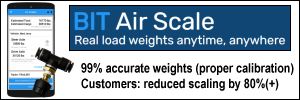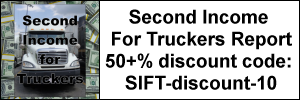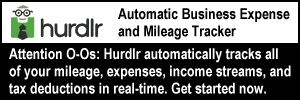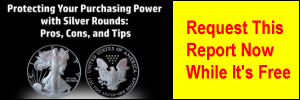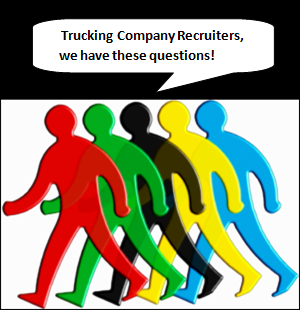
Trucking companies frequently utilize recruiters to recruit new and experienced truck drivers to drive for them.
We would like to believe that they are all honest and provide drivers with all of the information they need to make an informed decision about hiring on with a company.
However, that’s not always the case.
Whether the recruiters are recruiting at truck driver training schools or from elsewhere in the trucking industry, if they are working for a trucking company, it is their job to find drivers to drive trucks.
Unfortunately, some of them paint rosy pictures of their trucking companies, meaning that they describe them better than they really are.
When it comes to recruiters, we provide on this page:
- our experience in dealing with them,
- info on those who hire new and experienced truck drivers; and
- a long list of questions — borne out of our experience — that you might ask before you hire on with any trucking company regarding the company, the equipment, the freight, operations, drivers, communication, benefits and accidents.
Not only does every trucking company have strengths and weaknesses, but it specializes in something, be it the type of freight they haul, the traffic lanes they use, the strength of their customer base, etc.
Many trucking companies now have websites that reveal the answers to some of the questions we ask on this page.
But to get a better picture of them, you should consider getting answers to as many of these “questions to ask recruiters” as you can.
 One indicator of the strength of a trucking company is its driver turnover rate.
One indicator of the strength of a trucking company is its driver turnover rate.
If a trucking company is attractive to truck drivers, they will want to stay.
If a trucking company treats drivers like raw meat, they will leave.
As one recruiter at one of the trucking companies for which Mike has worked once said, “If things are all ‘peaches and cream’ at your company, then why does it have X% (higher than 100%) turnover?”
Truck drivers, too, have their preferences.
Some drivers prefer working for a larger trucking company with diversified freight; others may prefer working for a smaller trucking company with specialized freight.
A strong “at-home” policy may be very important to some drivers; others may prefer to be on the road for months at a time.
Take a moment to realistically describe your ideal set-up.
Recruiters: Our First Experience
Our first experience in dealing with any trucking company recruiter began when we attended a “hiring orientation” hosted by J.B. Hunt in Columbia, SC.
When we expressed an interest in driving, we were referred to the recruiter for the truck driver training school (not the trucking company).
When we wanted to learn more, he desired to make an appointment so that we could talk with him in his office at a later date.
We followed through with meeting the driving school recruiter.
At that point, we were thinking that only Mike would drive, not Vicki.
Then the recruiter asked Mike, “Is she [meaning Vicki] going to drive, too?”
We were dumbfounded.
Mike asked him if he could picture Vicki behind the wheel of a big rig.
Without hesitation, the recruiter said, “If her feet can touch the pedals, yes, sir, I can!”
After leaving the recruiter’s office, we were compelled to pray and make out a list of pros and cons about whether or not Vicki should drive with Mike.
It sure seemed sensible for a wife who planned to travel with her husband on the road to know how to operate the truck as well.
And if we teamed, we could make much more money, much more quickly!
We felt the Lord leading both of us to drive professionally and get training at the same time.
To our credit, we did look around at other truck driver training schools, although we didn’t know as much about what to look for then as we do now.
We ended up at the school that the recruiter was recruiting for.
Recruiters: Hiring New Truck Drivers for Trucking Companies
 Well into our time at truck driver training school, we began hearing the “pitches” of various trucking company recruiters.
Well into our time at truck driver training school, we began hearing the “pitches” of various trucking company recruiters.
At least one of them was, well, crude.
He cracked off-color jokes, which — while he got laughs from the majority of our class — cast a very UNprofessional light on his motor carrier in our eyes.
Evidently, he realized his blunder when he looked out into the audience and saw us with our arms folded across our chests and un-amused looks on our faces.
(Just because we were going to become professional truck drivers does not mean that we have low moral standards!)
Contrast the jokester with the Sergeant Major named “Earl,” who came in dressed to the nines in extremely professional attire.
In fact, he was different from all the other recruiters who traipsed through the school that fall.
Earl spoke authoritatively and convincingly about his trucking company.
We speculate that based on his appearance and mannerism alone, this trucking company recruiter was extremely successful in his work.
The only thing we ever thought negatively about him was that he talked about fax machines being put in his company’s trucks and we never saw any evidence to that effect once we started working for his company.
Recruiters: Hiring Experienced Truck Drivers for Trucking Companies
Mike has talked with a number of other recruiters through the years.
Much of the information that was a mystery to truck drivers in the 1990s is now openly available on trucking companies’ websites.
Drivers can cut through the recruiters’ lines to get some solid facts.
 Here’s how not to fall for recruiters’ well-rehearsed lines or the glamour of ads in the trucking magazines: Ask questions and get answers.
Here’s how not to fall for recruiters’ well-rehearsed lines or the glamour of ads in the trucking magazines: Ask questions and get answers.
Yes, the list of questions below may seem “over the top” in length and detail; but if you ask the ones that are most important to you — and get answers — you will have a clear understanding of the trucking company’s strengths and weaknesses and whether or not that company is a good fit for you as a professional driver.
Feel free to use any or all of these questions the next time you’re thinking of working for a new or different trucking company.
We’re going to break these questions to ask trucking recruiters into the following categories on linked pages:
- about “the company”;
- about “driver qualifications”;
- about “the equipment”;
- about “freight”, “freight lanes” and “hiring area”;
- about “operations”‘;
- about “the drivers”;
- about “communication”‘
- about “dispatches”;
- about “the benefits”;
- about “accidents.”
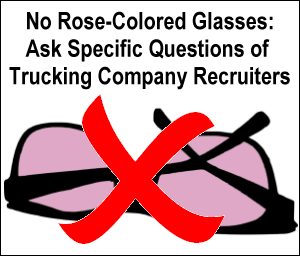 Questions to Ask Recruiters About “The Company”
Questions to Ask Recruiters About “The Company”
- Company background and management
- When was the company founded?
- By whom was the company founded?
- Is the company privately or publicly held? (If publicly held, what is its stock symbol?)
- Was the founder of the company ever a professional driver?
- How long was the founder of the company a professional driver before establishing his own trucking company?
- Do all members of the company’s management know how to drive trucks?
- Do all members of the company’s management take at least one trip per year, either as a driver or with a driver, to stay “in touch” with what drivers face on the road?
- How many levels of management (President, Vice Presidents, etc.) does the company have?
- How many total employees does the company have?
- How many fleet/driver managers does the company have and do they have professional driving experience?
- How many dispatchers or planners does the company have and do they have professional driving experience?
- If the company claims to have an “open door policy,” how does it define the term?
- Is management open to receiving information about shippers or consignees provided by drivers?
- Company Customer Base and Goals for Expansion
- How many of the following does the company have?
- Customers overall;
- Customers in the Fortune 500; and
- Customers with high volume (shipping, say, 2-3 loads per day or more)?
- What are the company’s goals for expansion in the next 1-2 years, and how does management intend to accomplish them?
- What percentage of growth does the company want in the next 5 years?
- What does the company need to keep up with its customer base?
- Does the company have — or is it seeking — ISO certification?
- How many of the following does the company have?
- Company Financial Status and Stability
- What is the company’s financial status?
- How financially solvent is the company?
- When was the last time the company conducted an efficiency study?
- What were the company’s profits during the last fiscal year?
- What percentage of the company’s profits were reinvested into the company during the last fiscal year?
- Did the company share any of its profits with its drivers during the last fiscal year?
- When was the last time the company’s financial records were audited and may I have either a digital or hard copy of the report?
Questions to Ask Recruiters About “Driver Qualifications”
- How many years of truck driving experience do drivers need to have before hiring on with your company?
- Which endorsements must new hires have to have, such as tanker, hazardous materials or other?
- What extra credentials must a driver have in order to work for your company, such as a certificate from a state’s Department of Motor Vehicles to haul hazardous materials, a TWIC card or passport to drive between the USA and Canada?
- Must the driver have any other skills, such as knowing how to operate a forklift for loading and/or unloading of freight?
Questions to Ask Recruiters About “The Equipment”
- If I hire on with your company as a professional driver and successfully complete orientation, will I be put in a truck immediately? (In other words, does the company have enough trucks for all of the drivers it hires?)
- If I will not be put in a truck immediately after successfully completing orientation, what is the company prepared to do (pay or otherwise)?
- Is the company committed to:
- Regular preventive maintenance? (If so, how is this tracked? By computer?)
- Regular inspections and maintenance of equipment (tires, brakes, lights, etc.)?
- Trouble-free operation of equipment?
- How many of the following types of tractors does the company have:
- Cabovers;
- Day cabs; and
- Conventionals?
- How many of the following name brands of tractors does the company have:
- Freightliner;
- International;
- Kenworth;
- Mack;
- Peterbilt;
- Volvo
- Western Star; and
- other?
- What kinds of trailers does the company haul:
- Dry vans;
- Refrigerated vans;
- Flatbeds;
- Drop decks;
- Car carriers;
- Oversized;
- Specialized;
- Tankers (bulk, liquid or compressed gas);
- Hazardous material units;
- Animal units (such as for cattle, swine, etc.);
- Log units;
- Containers;
- Doubles or Triples (including “high cubes”); and
- other?
- How many of the following name brands of trailers does the company have and are they leaf-spring or air rides:
- Dorsey;
- Fruehauf;
- Great Dane;
- Hyundai;
- Ravens;
- Stoughton;
- Trailmobile;
- Transcraft;
- Utility;
- Wabash; and
- other?
- What is the average age of the company’s:
- tractors and
- trailers?
- What is the maximum age of the company’s:
- tractors and
- trailers?
- Does the company use a computer program to track the location of all its tractors and trailers at any given time? (Example: Schneider’s “Trailer TRACS.”)
- How many terminals does the company have and where are they?
- Is preventive maintenance done at the company’s terminal(s)? If not, where?
- At what mileage is a tractor retired?
- What does the company do with its old equipment?
- How does the company acquire “new” equipment: either brand new or “new” to the company (such as from other carriers)?
- What condition are the company’s tractors and trailers kept in?
- Do the tractors have CB connections and antennas?
- What percentage of your trucks have APUs (auxiliary power units) in them?
- Are there specific items that the company forbids in its tractors, such as:
- a portable toilet or
- an inverter pulling more than a certain number of watts?
Questions to Ask Recruiters About Freight Lanes and Hiring Areas
- What kinds of freight does the company haul?
- What percentage of freight hauled is considered “truckload” and “less-than-truckload” (LTL)?
- What percentage of freight is considered hazardous material?
- What freight lanes (and which interstates) does the company use most?
- In what states do the company’s drivers drive most?
- What is the company’s hiring area?
- Does the company have any dedicated routes? If so, from and to where, and which drivers have the opportunity to get these routes?
- What is the average length of time between delivery of one load and dispatch/assignment of the next?
- Are drivers forced to take loads into Canada, New York City, or other high-risk areas?
Questions to Ask Recruiters About “Operations”
- By what means is percentage of idling of a driver’s truck calculated?
- If in order to stay comfortable (staying warm in the winter or cool in the summer), a driver has a higher percentage of idling than desired by the company, will that “over-idling” be counted in any way against the driver? If so, in what way will it be counted against the driver (example: such as against a fuel bonus)?
- Regarding the Driver’s Operations Manual:
- Does it include all policies under which drivers are bound?
- Does it include all procedures that drivers must follow?
- Does it include all of the company’s rules?
- Is it subject to change at the whim of management without an update given to all company employees?
- How often is it updated?
- Does the company have an ongoing training program (or offer refresher courses) -– possibly by means of DVDs or videotapes -– to keep drivers’ skills sharp so as to reduce or eliminate accidents?
- How long is the company’s driver orientation (example: 2, 5, or 7 days) and of what does it consist?
- Do prospective drivers get transported, paid, fed and housed completely at company expense during orientation?
- Does the company have a commitment to driver retention, and if so, how does the company work to accomplish it?
- At what point in time does a driver start receiving waiting time or detention time pay when he/she is delayed while freight is being loaded or unloaded from the truck?
- How much per hour do drivers get for waiting time?
Questions to Ask Recruiters About “The Drivers”
- On average, how many miles per week do drivers at this company get paid each week?
- For my level of trucking experience, how much will I get paid (by the mile or per hour)?
- On which basis are drivers paid:
- Air Miles,
- Household Mover’s Guide (HMG) / Household Goods (HHG) Guide Miles,
- Practical Miles,
- Short Route Miles, or
- Hub Miles?
- How many of the following designations of drivers does the company have:
- Solos;
- Teams;
- Company drivers; and
- Owner operators or independent contractors?
- Will I need to own my own truck or have my own authority?
- How long has the average driver been with the company?
- How many drivers or trucks are assigned to a specific fleet/driver manager?
- Over what is a fleet/driver manager responsible? (Examples: fuel stops, routing, extra pay, scheduling time off.)
- Which better describes the fleet/driver manager’s job: to help the driver or keep him/her “in line”?
- With whom do drivers communicate most and how?
- How many years of recent verifiable OTR driving experience must a driver have before he can hire on with the company and go out in a truck alone without having a trainer with him/her?
- What is the company’s turnover rate of drivers? (If it is high, ask why it is high.)
- Does the company have regular meetings with all of its drivers? (Example: Are “safety meetings” mandatory, and if so, does the company work to get its drivers to the terminal to attend them?)
- Does the company have a “road team” (which represents the best of the trucking industry)?
- Does the company take drivers’ suggestions seriously and try to implement them where possible?
- Does the company conduct a regular survey (written or virtual) to get feedback from its drivers? If so, what does the company do with the survey feedback it receives?
- Does the company “slip seat” its drivers or assign drivers to trucks?
- After how much time off does a driver “lose” his/her assigned truck?
Questions to Ask Recruiters About “Communication”
- Does the company use satellite communications to stay in touch with its truck drivers?
- Regarding satellite communications (such as QualComm):
- What percentage of the time is the system used in comparison to the phone (examples: 90/10, 80/20, 70/30, etc.)?
- What types of information is the driver required to enter into the system (examples: hours of service, loaded call, payroll, weather, etc.)?
- What types of information can the driver get from the system (examples: directions to customers, routing, fuel solutions, paycheck info, etc.)?
- If a driver has a question, is it best for him/her to submit it over the system or call on the phone?
- Who receives and responds to a particular driver’s satellite communications messages (examples: fleet/driver manager, dispatcher, planner, etc.)?
- If a driver has trouble communicating with his/her driver manager or fleet manager, is there someone else higher up to whom he/she can appeal? If so, who is it?
Questions to Ask Recruiters About “Dispatches”
- Does the company have “forced dispatch”?
- Does the company require drivers to go to Canada, Mexico or New York City?
- Does the company dispatch drivers to pick-up or deliver to ports (which may or may not require a TWIC card)?
- Are any of the loads dispatched categorized as “driver unload” and if so, how much is unloading pay for the driver versus how much the company will pay a lumper?
- What happens if a driver refuses to take a dispatch for a legitimate reason?
Questions to Ask Recruiters About “The Benefits”
- Will I have to pay for my own DOT physical or does the company pay for that?
- Which employee benefits does the company provide for its drivers:
- Direct Deposit?
- Major medical health insurance coverage (and through what company and who does it cover)?
- Dental insurance coverage?
- Supplemental medical coverage?
- Vision or eye care coverage?
- Life insurance?
- 401K retirement?
- Stock options? If so, at a reduced rate for drivers?
- Profit sharing? If so, on what percentage is this calculated?
- Payroll deduction programs to enable services to be provided on a pre-tax basis?
- Orientation pay?
- Family members being able to ride with the driver?
- Pet program?
- Company uniform program (whether paid by the driver or the company)?
- How long must a driver be employed by the company before benefits kick in? (or how long is the probationary period?)
- Which of the following bonuses are available and how are they calculated and paid out to drivers:
- Fuel bonus? (Calculation example: as a percentage of the miles covered or on a cents-per-mile basis.)
- Safety bonus? (Calculation example: as a percentage of the miles covered or on a cents-per-mile basis.)
- Performance bonus? (Calculation examples: as a percentage of the miles covered or on a cents-per-mile basis.)
- Sign-on or recruitment bonus?
- Driver referral bonus?
- Regarding vacation policy:
- How far in advance must a driver request vacation?
- On what basis is vacation pay paid out (examples: flat rate or cents-per-mile average of last year or quarter)?
- Regarding “at-home” or “time off” policy:
- How many days off does a driver receive for every day on the road?
- How far in advance must a driver request to get home?
- How many of the company’s terminals have any or all of the following amenities for drivers: physical fitness equipment rooms, sleeping rooms, regularly cleaned shower rooms with supplied towel and washcloth, ice machines/makers, free washers and dryers, café or grill for buying freshly prepared food, etc.?
Questions to Ask Recruiters About “Accidents”
- Where do most of them happen (which geographical locations)?
- What kinds of accidents happen most (example: backing)?
- How many accidents did drivers have last year?
- How many accidents occurred during the winter months?
- What percentage of accidents occurred in truck stops?
- What programs are in place to train drivers to avoid accidents?
![]() Money saving tip: There can be very expensive consequences if you do not ask recruiters the right questions prior to getting truck driver training or hiring on with a specific trucking company.
Money saving tip: There can be very expensive consequences if you do not ask recruiters the right questions prior to getting truck driver training or hiring on with a specific trucking company.
For example, if a driver hires on with a company thinking that it will get him home every weekend, but the company gets him home only once every two or three months, the driver may get angry, distracted from his/her job responsibilities, and risk getting involved in an accident which could cost him/her the job (and possibly driving career).
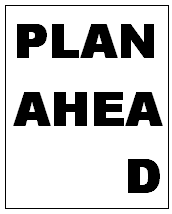 Also, take advantage of talking with other drivers about their trucking companies, either in person or via message boards on trucking forums.
Also, take advantage of talking with other drivers about their trucking companies, either in person or via message boards on trucking forums.
Ask what they like, what they don’t like and how they are treated.
Be ready for a wide variety of responses.
There may be some things that you don’t want to hear; but the important thing to remember is: it is your driving career that is at stake.
Remember: Plan ahead.
Return from Ask Recruiters Who Recruit Truck Drivers These Questions to our Truck Driving Jobs page or our Truck Driver Training Schools page or our Truck Drivers Money Saving Tips home page.
Reference
* http://www.truckinfo.net/trucking/stats.htm

